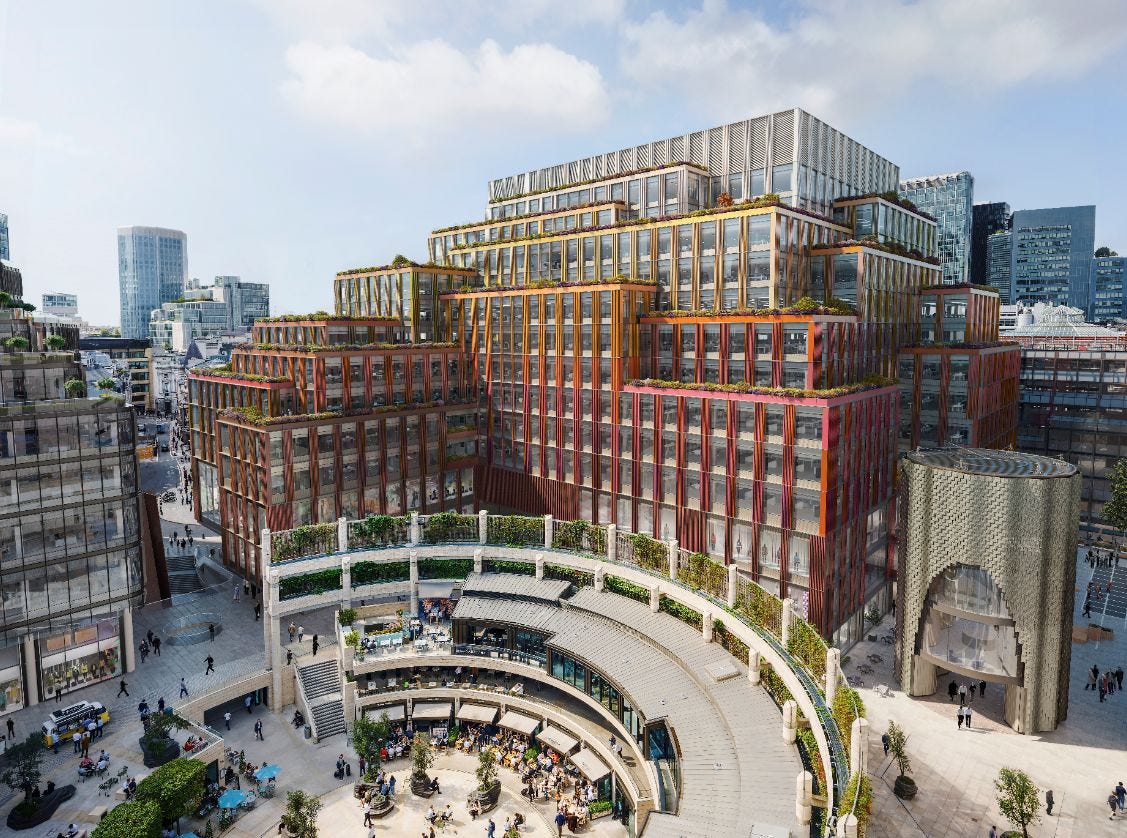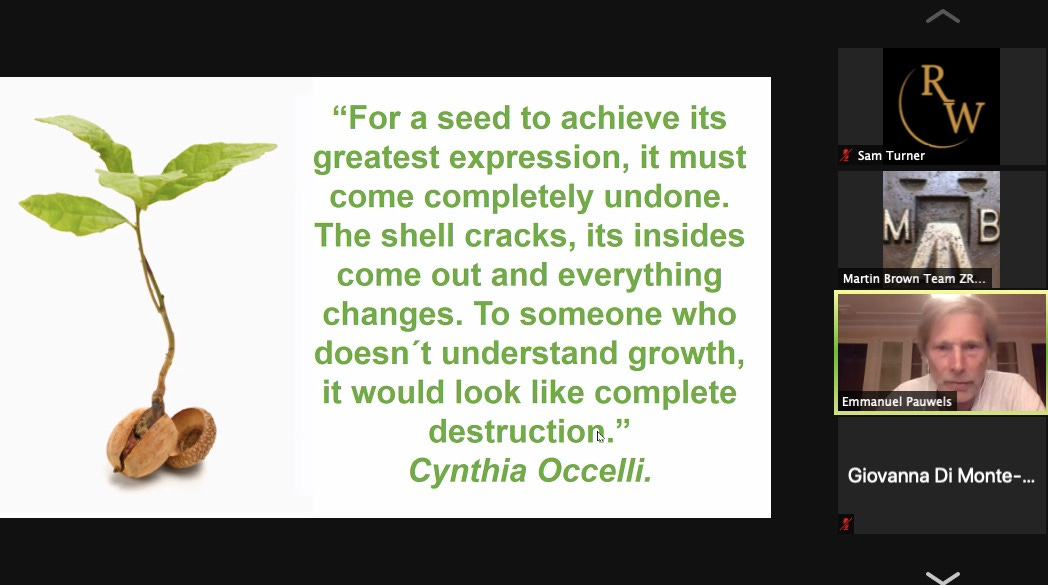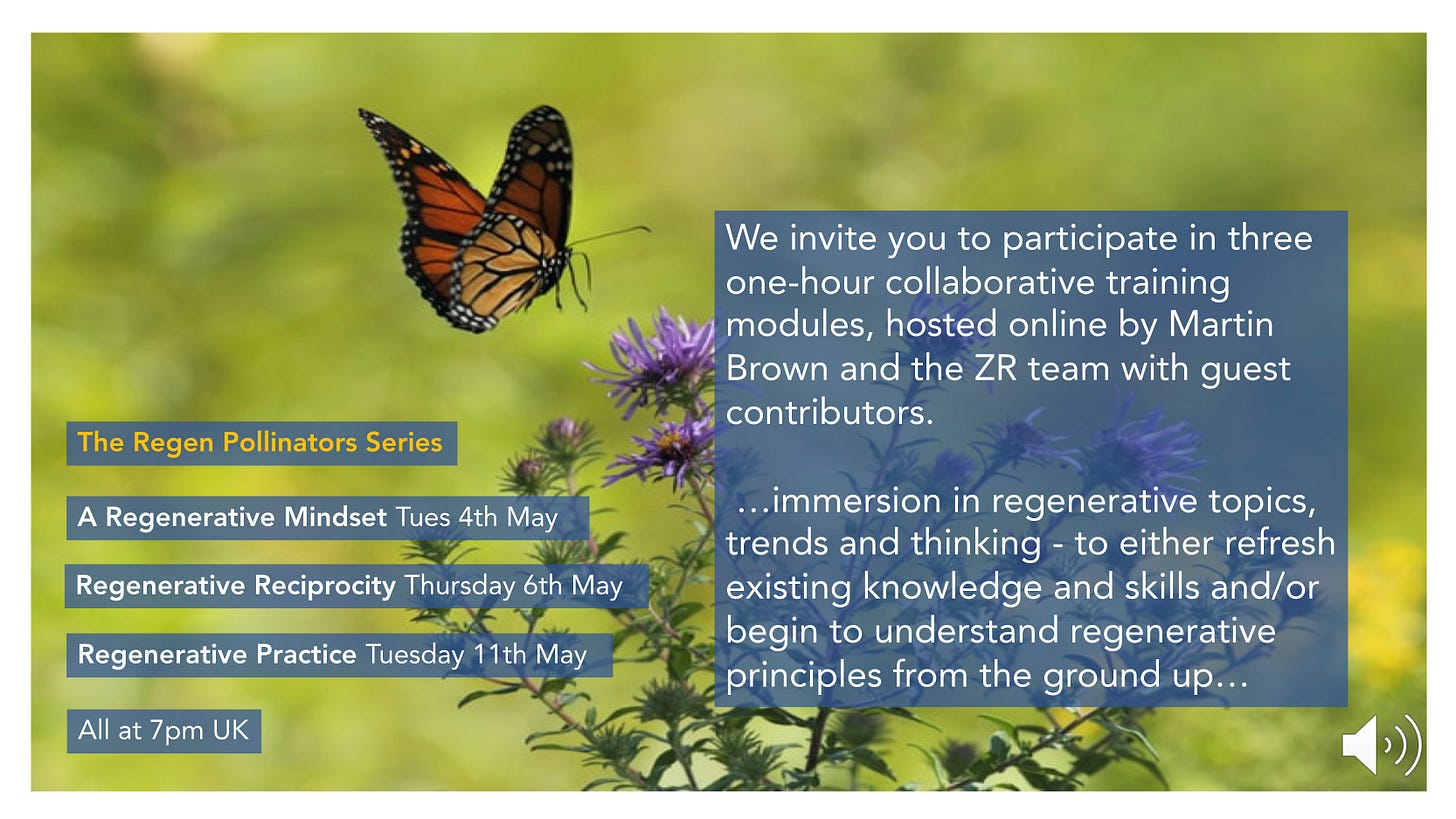Welcome to Regen Notes, your fortnightly newsletter of regenerative news, stories and more that pass through my feeds, with a sideways focus on the built environment, curated by Martin Brown and a companion to Zoom Regenerative.
COP26
Greta Thunberg set hares racing recently with comments on inequality in attending COP26. Greta has stated she will not attend unless everyone has an equal opportunity to do so, referring to inequality in vaccinations around the globe. Whilst she has no formal speaking session at COP26, her attendance would give a stamp of authority that is perhaps badly needed by the UK Government. Meanwhile, her BBC documentary, Greta Thunberg A Year to Change the World, is reported as a composed and noble film packed full of science by inews
“The planet is burning. It’s time for journalism to recognise that the climate emergency is here.” Ahead of EarthDay 2021, the Guardian is partnering with newsrooms around the world in a joint initiative Covering Climate Now calling on journalists to treat the climate crisis like the emergency it is.
Carbon
The French government has approved a ban on domestic flights that could be completed by train in under 2.5 hours. This is the first measure of its kind in Europe and was first proposed by the Citizens’ Climate Convention. (Nice to see this has the same thinking as our RESTORE Carbon Neutral Strategy, based on the FutuREstorative carbon hierarchy ARRO, Avoid, Replace and Reduce, and only then Offset)
Race to Zero
It is good to see more and more built environment organisations signing up to the UN Race To Zero campaign (Mott MacDonald, British Land, Lendlease to name a few) through the ‘Business Ambition for 1.5°C coalition)
Race To Zero is a global campaign to rally leadership and support from businesses, cities, regions, investors for a healthy, resilient, zero-carbon recovery that prevents future threats, creates decent jobs, and unlocks inclusive, sustainable growth. It mobilizes a coalition of leading net zero initiatives, representing 471 cities, 23 regions, 1,675 businesses, 85 of the biggest investors, and 569 universities.
British Land announced in March that their Broadgate flagship project, 100 Liverpool Street is net-zero carbon. “In line with our commitment to re-use first, we were able to retain 50% of the existing structure so embodied carbon was low at 390kg CO2e per sqm, already below our 2030 target of 500kg CO2e per sqm. This approach also enabled us to complete the building faster and more cost-effectively than building from new. We have made low carbon choices throughout and adopted smart technologies to enhance operational efficiency as well as the customer experience, for example by optimising light and heat” British Land offset strategy is to “focus on nature-based solutions that absorb carbon through growth rather than carbon avoidance or renewable energy projects.
And all this is so necessary - on 4th April 2021, The highest ever CO2 Levels in recorded human history were registered at Mauna Loa where the Daily CO2 topped at 421.21 ppm. In contrast, this is an increase from 349.19 in 1987 when we all pledged to “do nothing today to compromise tomorrow’s generation” as part of the Brundtland Common Future report.
“Carbon labelling of food shifts people’s behaviour—even among those actively trying to avoid information”. An interesting article in Anthropocene Magazine - Could a similar approach to building materials shift operatives behaviour on sites? Or in DIY stores? What if every brick, basin and downpipe was clearly labelled with the climate and carbon facts?
Sky News recently launched their daily climate news show that features the Countdown 2° Clock that acts as a public line in the sand, as a measuring stick by which we can evaluate our progress”
Meanwhile, Vinci recently published an FM Climate White Paper that makes a valid case for Facitliies Management to have greater involvement and influence in shaping and developing clients climate strategies.
The world’s “polluter elite” must now be the focus of government policies to tackle the climate crisis, is the focus of a new report from the Cambridge Sustainability Commission on Scaling Behaviour. The wealthiest 5% alone the ‘ polluter elite’ contributed 37% of emissions growth between 1990 and 2015
Natural Solutions
There’s more to timber building than trees - a fascinating article from Kiel Moe explores the premise that if a tree sequesters carbon as it grows, then mass timber building components must count as stored carbon. But what happens when that wood, the forest, is itself a source of carbon emissions during its growing life, as is happening in Canadian forests for example. Making the carbon sequestration calculations hellishly difficult?
Yet as Ed Gillispie wrote a while back, and a quote I use often, Our planet wants to be loved. Love is not a game of numbers and spreadsheets, checks and balances, debts and contracts. It is an exalted dance of joy, respect and gleeful, mutual appreciation and true partnership. Maybe there is another way, a more symbiotic worldview approach. Something Zoom Regenerative will explore in our upcoming regenerative tutorials - see below.
Biophilia
That Biophilic Design is becoming more and more mainstream, especially within interior design, is reflected in Vogue Magazine’s article What is Biophilic Design? This Nature-Based Interiors Trend Promises Wellness
I am delighted that our paper Exploring Challenges and Opportunities of Biophilic Urban Design: Evidence from Research and Experimentation has been published in Sustainability Journal. It has been a pleasure to work with the brilliant minds of Maria Beatrice Andreucci (Italy), Angela Loder (US), Jelena Brajkovic (Serbia) on this RESTORE paper.
Likewise, it was good to finally send our latest publication, RESTORD A Regenerative Guide for Educators, Students and Practitioners to graphic, layout and production. Once again it has been a delight and privilege to collaborate with great people in Restore and beyond. Education is a vital element of the regenerative agenda, inspiring the next generation to reach higher, be bolder, more courageous and more disruptive for positive change than we have been. Watch this space for publication date.
Zoom Regenerative
Emmanuel Pauwels inspiring session on Zoom Regen 30 from his awesome Cal Guerxo Living Building home in Spain, had, I am sure, many reaching for the principles of Permaculture, with his comment that “all Architecture education should start with an understanding of Permaculture Principles.” (There is a good summary of the principles here on)
Permaculture principles allow us to create a culture that can endure and thrive for generations to come. At its heart are three very simple tenets or ethics: a care for the planet, a care for people, and a Fair share that returns surplus.
Earthday Session - Restore Our Earth
For Zoom Regenerative 31 on the 20th of April, we team up with the COST Restore READY programme for a hybrid event, hosted in Sabden, UK with Alison Watson, Ann Vanner and Anna Williamson. This is going to be one brilliant day, packed with over 25 regenerative sessions, all with a common purpose to Restore Our Earth. (This year’s Earthday call) Registration and details here.
The ZR Regen Pollinator Tutorial Series
We invite you to participate in three one hour collaborative modules, hosted online by Martin Brown and the ZR team with guest contributors. The three modules will provide an immersion into regenerative topics, trends and thinking - to refresh existing knowledge and skills and/or begin to understand regenerative principles from the ground up and to view them holistically.
Regenerative Minds. 4th May. A deeper understanding of what regenerative is and means within our built environment context. Perhaps all too often we use the Einstein quote that “we cannot solve problems with the same mindset that created them”. Yet we may not fully appreciate the mindset now needed to move forward with the regenerative, do more good, not just reduce impact, approach. This session will explore, using design and living systems thinking, how we can acknowledge that we inhabit a biosphere that is interconnected and interdependent.
Regenerative Reciprocity. 6 May .An understanding of a reciprocity based connectivity with nature and each other, through, and beyond biophilia. This module examines and goes beyond biophilia (love of life) to explore an understanding of what reciprocity can mean for us in the built environment. There are no transactional relationships in nature where living systems are based on reciprocity.
Regenerative Practice. 11May. Exploration of project management approaches for regenerative projects. Moving from ‘systems thinking to ‘living systems thinking’ to provide a new form of symbiotic collaboration. Where we have power with, not over. Like the roots of a tree, or a complex web of mycelium, our collaborative strength is dependant on the strength of others, and vice-versa.
Registration and more details here
And zooming forward - we are designing the next season of Zoom Regeneratives that will re-zoom in May and will feature more inspiring guests.
Nightingales
Finally, one of the highlights of the first lockdown for ma and any others was the amazing and spellbinding Singing with Nightingale sessions from Sam Lee. These sessions are back for 2021 with live recordings on Youtube (14th April, 22 April and 01 May)










